- Home
- Jim Thompson
Now and on Earth Page 22
Now and on Earth Read online
Page 22
I turned, half-squatting, sick with pain. I don’t think anyone can know how much those piles hurt. Busken was holding the broom, giggling, still fencing at me with the end of it.
“He, he! Mustn’t jump so high, Red. Might drop a bomb out of—”
I snatched the broom from his hands and brought it down on his head. Rather, I aimed at his head. He threw his head back and the tough sharp straws swept down across his face. Instantly it was bleeding in a dozen places.
I was sorry, of course, as soon as I’d done it. But Vail had to choose that moment to say the thing that infuriates me more than any other.
“Why don’t you pick on someone your own size?”
So I let him have it, too. And I did get him in the head.
Then Gross was trotting up, pushing his way around them. This was what he had been waiting for—the chance to put himself in good with everyone.
“Let me get him, guys. Just let me get ahold of the Red son-of-a—”
I swung on him. Not with the broom, but with a two-pound sack of bolts. I don’t know why it didn’t kill him.
Then the guards came.
25
When did you join the Communist Party, Dillon?”
“Late in 1935. I forget the month.”
“What was your motive in joining?”
“The usual one, I suppose. I was pretty disgusted with the old-line parties.”
“There wasn’t any other inducement?”
“Well, yes. There was usually some good conversation. I like good talk.”
“You weren’t paid any money?”
“On the contrary.”
He wasn’t as old as I was, the FBI man. He had yellow hair, combed straight back from his forehead, and the blandest blue eyes I have ever seen. That is, they appeared bland until you met his gaze square-on. Then you saw that they were something else.
“Is Dillon your right name?” said the plant chief-of-police.
“You’ve seen my birth certificate.”
The chief brought the front legs of his chair down to the floor with a crash. His finger shot out.
“I asked you if Dillon was your right name!”
“Let’s let Mr. Reynolds handle this,” said Baldwin, frowning at him. And the FBI man took up again:
“Now you dropped out of the party you say?”
“Yes. In the spring of ’38.”
“What was your reason?”
“It caused trouble at home, for one thing. My wife and children are Roman Catholic.”
“Weren’t they Roman Catholic when you went into the party?”
“That wasn’t the only reason. A number of the people I’d known had moved away. It didn’t seem the same without them.”
Reynolds stared at me, and I couldn’t look away from him.
“What was the real reason you dropped out?”
“I’ve told you.”
“No you haven’t.”
“All right,” I said. “I was beginning to drink pretty hard about that time. They didn’t want me as a member.”
“You were kicked out then?”
“No. I took some hints.”
The chief leaned forward. “If it hadn’t been for that, would you still be in the party?”
Baldwin said, “No one can answer a question like that, Chief. I couldn’t decide now what I might have done in the past under different circumstances. I’m no longer the same man that I was then.”
“Besides that,” said Reynolds, a faint flicker of a smile on his lips, “I don’t think Mr. Dillon would give us an answer that would prejudice us against him.”
I didn’t say anything. His smile disappeared.
“Had you ever done any aircraft work before you came here?”
“None at all.”
“You knew nothing about it?”
“No.”
“Let me see Dillon’s employment record, Baldwin.”
Baldwin handed him a sheet of typewritten paper. Reynolds studied it.
“What would you say about this record? Is it unusual? Good or bad?”
“It’s exceptionally good. I’ll even say that we’ve never had a new man who did as well.”
I think he realized that he was hurting me, even as he said it. But, after all, the opposite would have hurt also.
“Now, Dillon. You’d never been in aircraft work before, you say, until you came here. And yet you are drawing more money than men who have been here two years and longer. You know more, you’re worth more, presumably. How do you account for that?”
“It may be,” I said, “because I needed money worse than they did. Most of them are single. I’m married, have children and other dependents.”
“I need money, too, Dillon. But it wouldn’t turn me into an A-1 aircraft man.”
“Well, I’ve held some pretty good jobs before I came here. Certain abilities can be used in one place as well as another.”
“Yes, but—”
“Dillon does mostly paper work,” said Baldwin.
Reynolds said, “What do you pay your clerical workers in the office, Mr. Baldwin?”
“Well—twenty a week or so.”
“And Dillon is getting twice that much. Why?”
“Well…I didn’t mean to say that he doesn’t have to know anything about aircraft—”
“He has to know a lot, doesn’t he?”
“Well— Oh hell. Yes!”
The chief crossed his legs and leaned back against the wall. I couldn’t see him smile, but I knew he did.
“When I came here,” I said, “I filled out an application blank. It gives my past employment record.”
Reynolds nodded. “It shows you as a free-lance writer most of the time for the past twelve years. You were your own employer.”
“Do you mean by that,” I said, “that during the time I was writing I was also doing aircraft work?”
“You could have been, Dillon.”
“Well I wasn’t.”
“Now you are no longer a Communist, you say?”
“I not only said it—I’m not.”
“You severed all connection with the party in 1938?”
“Yes.”
“All right. But despite that fact, the Communist Party supplies you with a new car and the money to travel halfway across the continent. So that you could go to work here.”
“Now wait a minute—”
“A man who stands convicted of criminal syndicalism and who is now under ten-year sentence gave you that car and the money to come out here on. Why?”
“I’m not answering that question,” I said.
“You don’t have to, Dillon. You can have a lawyer if you want one.”
“I don’t want one. But I don’t want to be asked the parallel of whether I’ve stopped beating my wife yet. I’ve told you how I got that car.”
“Tell me again.”
“I met Mike Stone in the Post Office. I told him I wanted a change in scenery, that I should really carry on some of my research in another area. He introduced me to his attorney who gave me the car to deliver here. Not to keep, but just to deliver. That’s all there was to it.”
“But why should Stone have cared whether you got here or not? You weren’t in the party any longer. Why should he want to do you a favor?”
“Why not?”
“Don’t ask me questions. I’m asking you.”
“I’ve answered. ‘Why not?’ is the only answer I can give. It wasn’t any trouble. The car had to be brought back here, and Stone knew I wouldn’t wreck it or run off with it. That’s all there was to it.”
The chief spoke up. “Fellows drive cars in here from the Middle West all the time, Mr. Reynolds. It saves freight charges. The dealers back there are glad to give a man his passage and a few dollars for driving a car out here.”
I was surprised. I began to feel a little more comfortable, too. But Reynolds seemed not to have heard.
“Mr. Baldwin,” he said, “I believe you’ve had a gre
at deal of trouble in your stockroom. Parts getting lost, mislabeled; unfinished parts and parts that belonged to other departments being stowed away in there, and consequently causing expensive delays. When did this trouble begin?”
“Well, six or seven months ago.”
“Or about the time Dillon went to work here?…Just a minute.”
The door opened and another man, a man who somehow looked like Reynolds, poked his head in.
“Nothing,” he said. “A few books but they were all from the Public Library.”
“Thanks, Jack.”
The door closed again.
“About your question,” said Baldwin. “Yes, our trouble did begin about the time Dilly started to work here. But that was also about the time when we were really getting into production. We’d received our first large Government orders. Before that an order for a dozen ships was an event. Everything was snarled up six or seven months ago. Every department was in a jam.”
“Are they still?”
“Well, we’re pretty well lined out now, but—”
“You’re still having trouble in your main stockroom, however?”
“Yes, but that’s the nerve center of the entire plant! And—and Dilly’s just about to get things straightened out in there. He’s set up a new records system that should remove a lot of the trouble.”
“But it hasn’t yet? Things are still far from what they should be?”
Baldwin admitted that they were.
“Now these discords and disputes between the various workers in the department? When did they begin?”
“Well…”
Baldwin scuffed his feet against the linoleum and lighted a cigarette. He exhaled a cloud of smoke and tapped the cigarette nervously into a tray.
“Mr. Reynolds, you’re making out a very bad case against a man who, at the worst, has only been misguided or too impulsive. Those quarrels can be attributed almost entirely to this fellow Gross. He’s a tale-bearer and trouble-maker from the word go, but he’s a husky devil and he’s clever. Dilly’s been catching the brunt of things that Gross started. Personnel shoved him off on us, or I’d’ve canned him long ago.”
“I took over Gross’s job, you see,” I said.
“Yes,” said Baldwin, “and Gross tried to get Moon fired one time.”
“And he looks down on Murphy because Murphy is part Mexican.”
“That Murphy is quite a kid,” said the chief, idly. “I saw him fight a couple o’ times.”
Reynolds glanced at his wrist watch, and I thought he sighed slightly. “We don’t seem to be making a great deal of headway,” he said. “Dillon came out here under circumstances that were suspicious—and yet weren’t suspicious. There were serious mixups from the time he went to work—but there might have been anyway. They haven’t ceased yet—but they will. Everyone in the department has been fighting and quarreling—but that could be Gross’s fault.” He looked around at us. “I think I might add that it’s practically impossible to obtain positive evidence of sabotage. The saboteur has to keep on working if he’s to be of any real value. He can’t pull a trick or two and skip out. He’s got to be clever. He’s got to do one thing and appear to be doing the opposite.”
“Dillon is on the spot and he isn’t on the spot,” said the chief. “It all depends on which way you’re looking at him.”
“Yes. I won’t say that he’s on it, but it would be a lot better if he could take a step in another direction.”
“Well,” said Baldwin, “I don’t know that I can say anything more than I have.”
“How about—what’s his name?—Moon? The lead-man. Is he still around?”
“I thought you’d already talked to him,” said Baldwin.
“Only in a general way when I talked with the others. Is he still around?”
“I’m not sure that he is. It’s pretty late and—”
“He’s here,” said the chief. “I thought you might want him. He’s waiting downstairs.”
“Have him come up, please.”
The chief went out. Reynolds sat staring at me. Baldwin lighted another cigarette from his first one.
“Mr. Reynolds,” he said.
“Yes?”
“Well, about Moon. He’s been somewhat jealous of Dillon. And I know he’s vindictive. I don’t believe that…”
He left the sentence unfinished.
“I see,” said Reynolds.
And I knew what he saw. Nothing that you could put your finger on. The suspicious linked with its antithesis. Proof, and no proof.
And I knew that no proof was necessary in these times. Only a belief in the mind behind those bland blue eyes. Only a charge. Conviction would be automatic.
Moon came in, half of a huge red apple in his hand. He took a bite as he laconically settled into the chief’s chair, and, chewing, he looked the FBI man up and down. He didn’t seem to mind looking into his eyes. His stare was as hard and straight as Reynolds’. Reynolds smiled faintly and shifted his gaze.
“You know why we’ve asked you to come up, Moon?”
“Yes,” said Moon, flatly. He turned the apple half a revolution and raised it to his lips.
“You’ve had some very serious trouble in the stockroom, Moon. It began at the time, or about the time, Dillon came here. Now—”
Moon held up his hand. He gulped and swallowed. “Jus’—just before Dillon came here I was trying to quit. Didn’t give a damn what happened. I let everything go, including that Gross guy. Dilly stepped right into the middle of a first-class mess.”
“Oh,” said Reynolds. “Maybe you’d rather finish your apple before—”
“I can talk all right,” said Moon. “It’d been a lot better for Dilly if he’d let things slide. Everyone would have liked him better. Wouldn’t do it, though, so here he is.”
“I see,” said Reynolds. “Now you’ve had the chance to observe Dillon very closely. You and he work largely in the stockroom, while the others spend much of their time outside. Did any of his actions ever strike you as being suspicious? Was there ever anything in connection with his work that seemed suspicious?”
Moon studied the remainder of the apple. He tossed it into the cuspidor. Thoughtfully he stared at the floor.
“Well—I don’t know. I don’t know whether you’d call it suspicious or not.”
The FBI man leaned forward. “Explain exactly what you mean.”
“Well—I used to think he was going to blow the place up.”
“Blow it up!”
“Uh-huh. Used to sit on that stool so long without going to the toilet I was afraid he was going to explode all over us.”
There was a dead silence.
Then Baldwin brought his open palm down on the desk and began choking and strangling on his cigarette. Reynolds reddened; but he grinned.
“I guess that’s all, Mr. Moon. Thank you for coming in.”
“Don’t mention it,” said Moon. And he strolled out, his hands swinging limply at his skinny shanks.
Baldwin wiped his eyes.
“I think it’s pertinent to tell you that Moon is leaving us. He’s been called back into the Navy. We could have had him deferred, but he wanted to go. So we didn’t try to hold him. We tried to keep him from leaving once before, and it didn’t work out so well.”
“Very interesting.” Reynolds got up and held out his hand to me. “We’ll try to get together again under more pleasant circumstances.”
I shook hands, not saying anything.
Baldwin said, “You’ll get to see Dilly, all right. He’ll be around. He’s taking over Moon’s job.”
26
When I reached the top of the hill that night, the corner, Moon was waiting for me in his car.
“Thought I’d say adios,” he said, as I got in and sat down. “Would have brought you home, but I thought it might not be a good idea.”
“You just about saved my neck,” I said.
“Yeah? Well, I guess I owed you something, Dilly. H
ow’s Frankie?”
“She’s going to be all right.”
“I wish I could have done what I should have. I liked Frankie, Dilly. It wasn’t just another one of those things.”
“I know. I know how it is.”
“Want a drink?”
“I guess not, Moon.”
“I guess I don’t either.”
“I’m sorry you’re leaving. I hope I’m—we’re not the cause of it.”
“I’d’ve probably gone anyway, Dilly. I’ve been looking for an excuse for a long time.”
“You know I didn’t want your job?” I said. “You know I’m not going back?”
“Don’t let me keep you from it, Dilly.”
“It isn’t that.”
He nodded. “I ought to’ve known you’d be too smart. You’ve got some good tricks, Dilly, but they wouldn’t carry you there forever. And it would be all the harder on you afterwards.”
“Yes, and that isn’t all, Moon.”
He waited.
“I don’t know,” I said. “Probably I’ll never be able to explain to anyone. Not even if I wrote a book…”
About the Author
James Meyers Thompson was born in Anadarko, Oklahoma, in 1906. In all, Jim Thompson wrote twenty-nine novels and two screenplays (for the Stanley Kubrick films The Killing and Paths of Glory). Films based on his novels include The Getaway, The Killer Inside Me, The Grifters, and After Dark, My Sweet.
…and Cropper's Cabin
In May 2012, Mulholland Books will publish Jim Thompson’s Cropper's Cabin. Following is an excerpt from the novel’s opening pages.
Cropper’s Cabin
It was almost dusk, and I knew that meant she’d be waiting for me, her car hidden under the thick willows, waiting just like she had been all along. It was a swell setup.
Her name was Donna. She was one-fourth Indian and three-fourths white, and that’s a blood mixture that’s hard to beat if you’re breeding for beauty. She had the beauty, all right—and plenty more. She could also mean plenty of trouble, if anybody found out about us.
I finished what I was doing and was beginning to feel that don’t-give-a-gol-darn crankiness that sneaks up on me when I get real hungry. You know. Maybe you get the same way. You almost hope that someone’ll say something to you so you can jump down his throat.

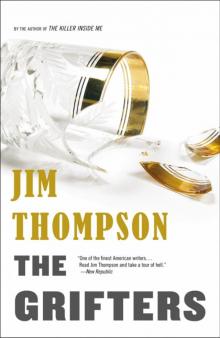 The Grifters
The Grifters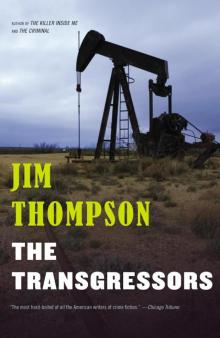 The Transgressors
The Transgressors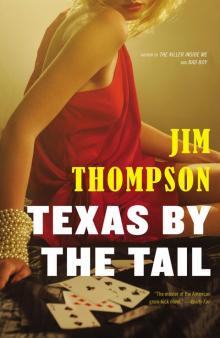 Texas by the Tail
Texas by the Tail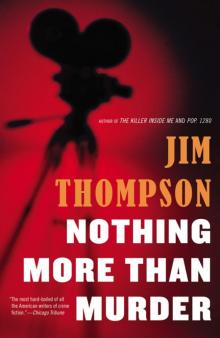 Nothing More Than Murder
Nothing More Than Murder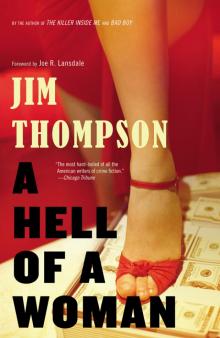 A Hell of a Woman
A Hell of a Woman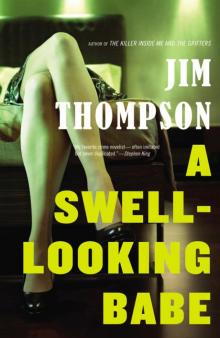 A Swell-Looking Babe
A Swell-Looking Babe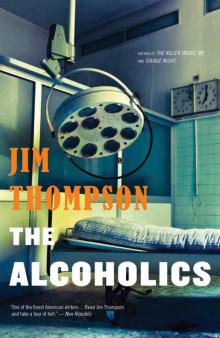 The Alcoholics
The Alcoholics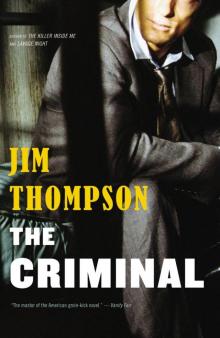 The Criminal
The Criminal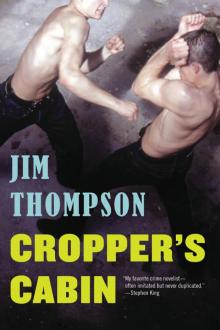 Cropper's Cabin
Cropper's Cabin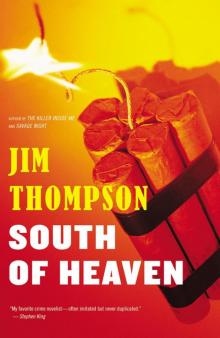 South of Heaven
South of Heaven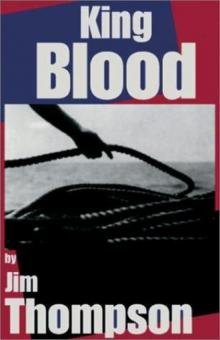 King Blood
King Blood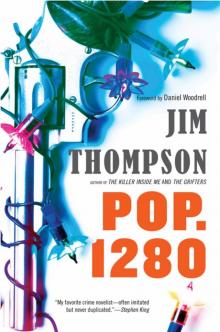 Pop. 1280
Pop. 1280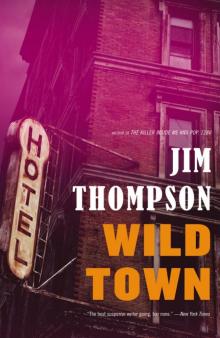 Wild Town
Wild Town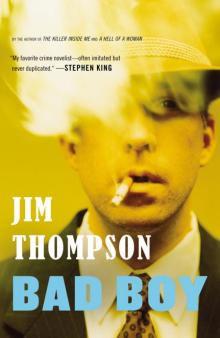 Bad Boy
Bad Boy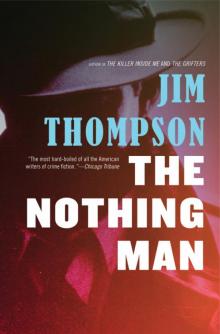 The Nothing Man
The Nothing Man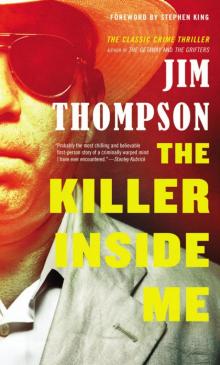 The Killer Inside Me
The Killer Inside Me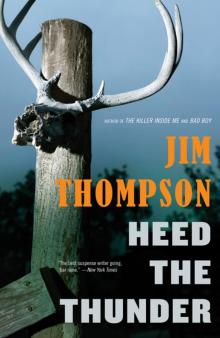 Heed the Thunder
Heed the Thunder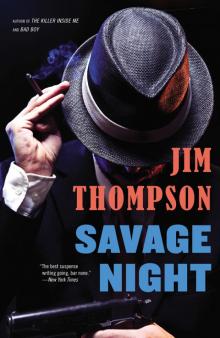 Savage Night
Savage Night Recoil
Recoil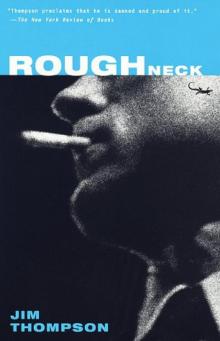 Roughneck
Roughneck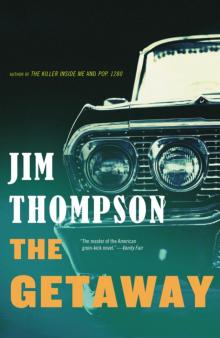 The Getaway
The Getaway